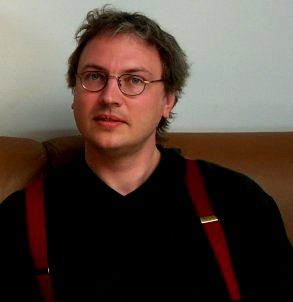Dr. Chrystopher Nehaniv
Dr. Chrystopher Nehaniv is Professor of Mathematical and Evolutionary Computer Sciences, School of Computer Science, Faculty of Engineering and Information Sciences, University of Hertfordshire, U.K where he is working with the Adaptive Systems, Algorithms, and BioComputation Research Groups. He is also Visiting Professor at Institute for Mathematics and Informatics at the University of Debrecen in Hungary.
He is Director of the UK EPSRC Network on Evolvability in Biological and Software Systems, Associate Editor of the Elsevier journal BioSystems: Journal of Biological and Information Processing Sciences, Associate Editor of Interaction Studies: Social Behaviour and Communication in Biological and Artificial Systems and a member of the Santa Fe Institute Evolvability Working Group.
Chrystopher has authored over 200 publications. He is editor of Computation for Metaphors, Analogy, and Agents (Lecture Notes in Computer Science / Lecture Notes in Artificial Intelligence) and Mathematical and Computational Biology: Computational Morphogenesis, Hierarchical Complexity, and Digital Evolution, coeditor of Imitation in Animals and Artifacts (Complex Adaptive Systems) and Algebraic Engineering, and coauthor of Algebraic Theory of Automata Networks (SIAM Monographs on Discrete Mathematics and Applications, 11).
Chrystopher has organized over 25 Special Issues, Conferences and Workshops. He is the program co-chair of IEEE International Symposium on Robot and Human Interactive Communication (RO-MAN) “Getting to Know Socially Intelligent Robots”, 6–8 September 2006, University of Hertfordshire, Hatfield, United Kingdom and was the organizer of the Special Sessions on Artificial Life and Complex Adaptive Systems at the 2005 IEEE Congress on Evolutionary Computation, Edinburgh, Scotland.
His current research takes a unified approach to natural and artificial systems, focusing on evolvability, self-reproduction, sensor evolution and use and communication of temporally extended information, developmental and differentiated genetic regulatory networks (DGRNs), automata networks, as well as humane design of human-machine interactive systems. He received his B.Sc. with Honors in Mathematics from the University of Michigan, Ann Arbor in 1987 and a Ph.D. in Mathematics from the University of California, Berkeley in 1992 for work in the algebraic theory of semigroups, groups, and automata.
